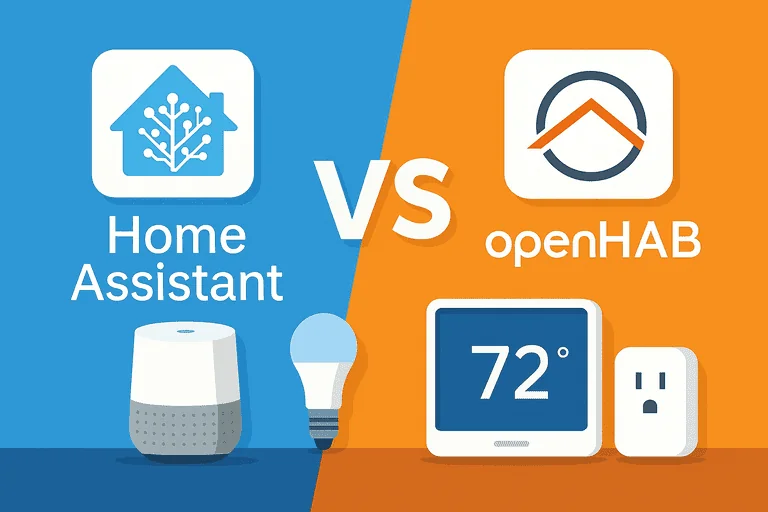Introduction
As smart home enthusiasts increasingly seek local control, privacy, and flexibility, two open-source platforms dominate the conversation: Home Assistant and OpenHAB. Both are powerful home automation hubs that let you integrate and automate smart devices on your terms—but which one suits you best?
This guide compares Home Assistant vs OpenHAB from both beginner and advanced perspectives, helping you decide which platform aligns with your self-hosting goals.
1. Philosophy and Ecosystem
| Feature | Home Assistant | OpenHAB |
|---|---|---|
| Founded | 2013 | 2010 |
| Community | Large, rapidly growing | Established, active |
| Development Pace | Fast (frequent updates, beta features) | Slower but stable |
| Ecosystem | Includes Home Assistant Cloud (optional) | Integrates well with Eclipse SmartHome |
| Focus | Ease of use, integrations, UI improvements | Modularity, abstraction, long-term setups |
Key Takeaway: Home Assistant prioritizes usability and pace. OpenHAB values consistency, stability, and modular architecture.
2. Installation & Setup (Beginner Focus)
| Aspect | Home Assistant | OpenHAB |
| Installation | Hass.io image, Docker, VM | OpenHABian image, Docker, manual |
| Initial Setup | Guided onboarding, UI-based | More manual, config file-heavy |
| Beginner Support | Extensive documentation, forums, YouTube | Forums, detailed docs, less video |
| Mobile Apps | Official iOS & Android apps | Yes, but less polished |
Beginner Tip: Home Assistant’s guided setup lowers the entry barrier—great for first-time users.
3. User Interface & Usability
| Feature | Home Assistant | OpenHAB |
| Default UI | Lovelace (fully customizable) | Basic, requires customization |
| UI Customization | Drag-and-drop dashboards | Text-based configs or HABPanel |
| Automations (UI) | Visual editor, YAML fallback | Mostly rule-based (text) |
| Learning Curve | Moderate (easy to get started) | Steeper (scripting knowledge helps) |
Pro: Home Assistant offers faster wins for visual learners and casual tinkerers. OpenHAB suits power users who like abstract control.
4. Integrations & Device Support
- Home Assistant supports 3000+ integrations—official and community-supported—like Zigbee, Z-Wave, MQTT, ESPHome, Shelly, Tuya, and more.
- OpenHAB supports wide-ranging bindings via its modular architecture, particularly strong in industrial/home hybrid use cases.
Advanced Users: If you run complex setups with rare devices, check compatibility before choosing.
5. Automation Engine & Scripting
| Feature | Home Assistant | OpenHAB |
| Languages Used | YAML, Jinja2, Python (via AppDaemon) | Rules DSL, Blockly, JavaScript |
| Visual Automation | Yes (UI-based builder) | Limited |
| Scene & Script Logic | Built-in scenes, scripts, blueprints | Rules engine, logic heavy |
Note: OpenHAB offers flexibility through DSL scripting. Home Assistant simplifies automation for less technical users while allowing advanced logic.
6. Performance & Resource Use
- Home Assistant is optimized for Raspberry Pi 4 or better.
- OpenHAB can run well on even older Pi 3 models, but benefits from better hardware.
Observation: Both are lean compared to commercial alternatives, but Home Assistant’s faster development may introduce breaking changes more often.
7. Privacy & Offline Capability
| Feature | Home Assistant | OpenHAB |
| Cloud Dependency | Optional (Nabu Casa) | Optional |
| Local Control | Yes | Yes |
| Telemetry | Opt-in | Minimal |
Both platforms are privacy-first, making them perfect for users avoiding cloud dependence.
8. Community, Documentation & Ecosystem
- Home Assistant:
- Large Reddit (r/homeassistant), Discord, forums.
- Active GitHub with frequent updates.
- Rich YouTube ecosystem.
- OpenHAB:
- Forums with in-depth technical discussion.
- Strong documentation (but less video/tutorial content).
Insight: Home Assistant wins on community-driven tutorials and pace of development.
9. Use Cases & Suitability
| Scenario | Better Option |
| Quick start, UI-focused | Home Assistant |
| Industrial/home hybrid setup | OpenHAB |
| Fully offline local automation | Both |
| Frequent experimentation & updates | Home Assistant |
| Complex logic-driven setup | OpenHAB |
10. Final Verdict: Which One Is Right for You?
Choose Home Assistant if:
- You’re a beginner or want a polished interface.
- You prefer fast onboarding and wide community support.
- Visual automation appeals to you.
Choose OpenHAB if:
- You’re experienced with config files and rules DSL.
- You want a long-term, low-maintenance setup.
- You prefer abstracted device control and modularity.
Tip: Still unsure? Try both on a VM or Raspberry Pi and explore. Your smart home journey doesn’t need to be locked into one choice.

